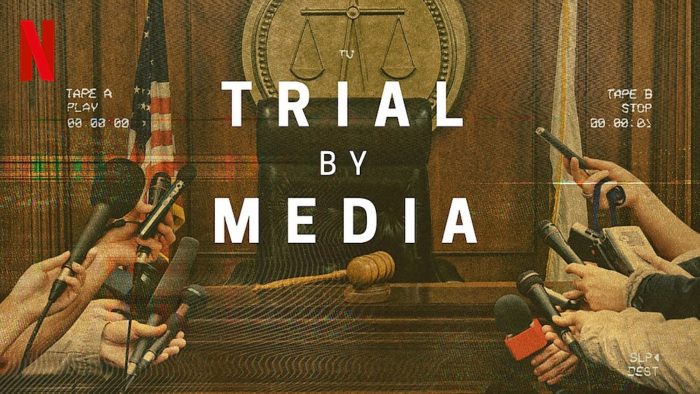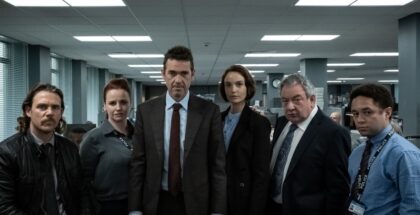True Crime Tuesdays: Trial by Media
Review Overview
Premise
8Analysis
4Sensationalism
5Helen Archer | On 16, Jun 2020
On Tuesdays, our resident true crime obsessive gets their fix with a documentary film or series. We call it True Crime Tuesdays.
While many recent true crime programmes have touched upon the role of the media, Netflix’s series puts the relationship between perpetrator and press front-and-centre – at least, in theory. Billed as an exploration into “the many ways in which the press have contributed to reshaping public perception about guilt or innocence before, during or after a trial”, the programme makers take six disparate high-profile cases and examines the media representation of them.
Sadly, the series is less about any kind of meaningful analysis and more about rehashing old crimes and court cases – which perhaps makes more sense when you consider that one of its executive producers (along with George Clooney and Jeffrey Toobin – who wrote The People Versus OJ, adapted into a TV drama by Ryan Murphy) is Court TV creator Steve Brill.
Court TV is one of the media outlets which is (very superficially) put in the dock over the course of the series – most specifically in the first and fifth episodes. The first perhaps most fulfils Trial by Media’s overall brief, scrutinising the 1995 murder of Scott Amedure after he appeared on The Jenny Jones Show. The long-running programme was a prime example of “ambush TV” – a confrontational style made popular by Jerry Springer, and reproduced by everyone from Rikki Lake to Jeremy Kyle. When Amedure appeared, to reveal his secret crush on acquaintance Jonathan Schmitz, he was cheered on by an excitable studio audience in footage which never aired, because three days after it was filmed, Schmitz killed Amedure.
It’s not just ‘ambush TV’ which gets a grilling, although the exploitation of ordinary people whose problems are manipulated for entertainment value is critiqued. The civil case against the talk show featured on Court TV, which was owned by Warner Brothers – the very company which also owned The Jenny Jones Show. Warner Brothers are, here, accused of profiting from the misery of others not once, but twice.
The soap opera nature of true crime as portrayed in Court TV is also commented upon in the fifth episode. Big Dan’s – named after the New Bedford bar which was the location of the 1983 gang rape of Cheryl Araujo – delves into the real-life case behind the Oscar winning film, The Accused. The daily broadcast of Court TV not only managed to release the name of the victim to the world, but also proffered the case as entertainment, with daily water-cooler moments, as people gawped at details of the appalling sexual assault when it was recounted in testimony.
In between these episodes, Trial by Media looks at the 1984 “subway vigilante” case, where Bernhard Goetz shot four black teenagers at point blank range on a New York subway after he felt they were going to mug him, and the way in which the media went to bat for him – lifting the lid on the racism behind not only the crime, but the press accounts of it. King Richard recounts the 2005 trial of Richard Scrushy, who, when accused of the financial fraud with regards to his healthcare company, appealed to the media before his trial via his own TV channel, in a manner which exposes corruption not just within the media, but within the whole justice system – a system that relies less on the truth and more about weaving false narratives.
Scrushy’s media manipulation is reiterated in the final episode, Blago, as former Illinois Governor Rod Blagojevich took to the media in an extended PR exercise, in a bid to clean up his name before his trial on various charges, including extortion. He took advantage of the chat show circuit, but it was his appearance on Celebrity Apprentice which ended up being the eventual boon to him. Despite being sentenced to 14 years’ imprisonment in 2011, his time with then-Apprentice host Donald Trump ended up coming in quite handy – the President released him earlier this year after some direct appeals to Trump from Blagojevich’s wife via Fox News.
Perhaps the most moving – and relevant – episode is the third, 41 Shots, which examines the killing of 23-year-old Guinean immigrant Amadou Diallo, who was shot 41 times by four police officers while standing, unarmed, at the door of his apartment building. While Trial by Media was obviously filmed and released before the killing of George Floyd and the subsequent worldwide protests and demands for US police abolition, it’s a timely reminder that white cops have been killing Black civilians without punishment for decades.
While each episode of Trial by Media throws up some interesting questions with regards to the media’s complicity in racism, misogyny, and deception, it ultimately skates right past them. It’s less an illumination of injustices than a reminder that they continue to exist, less a self-examination of the symbiotic nature of media and crime than a carefully curated series of cases that seem handpicked to appeal to the very sensationalism it seeks to critique.
Trial by Media: Season 1 is available on Netflix UK, as part of an £9.99 monthly subscription.



















